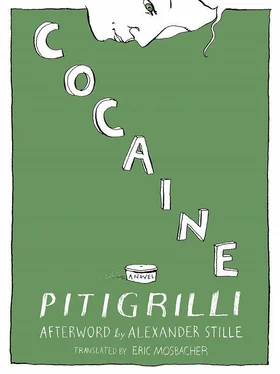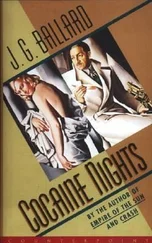The situation was saved. As Thomas Salmâtre’s sausages had no trademark, no one knew he had eaten them, and the directors confirmed the editor in his job, though he had to commit himself to paying a pension for life to Salmâtre’s widow and to providing for the education of his nine innocent children.
Tito was not sent back to Bordeaux, so he was able to return to the arms of the beautiful Armenian lady and the no less beautiful arms of his Italian neighbor at the Hotel Napoléon.
He had begun to fall in love with Maud on the day of her arrival in Paris. But “day” is too vague a term. The beginning and end of a love affair can be established with astronomical precision in hours, minutes and seconds. He had begun to fall in love with her at the moment when, leaning on the windowsill (with the porphyry Vendôme column vibrating like transparent liquid) she told him how she had given herself to a man for the first time. “I hardly knew him,” she said. “He was just an ordinary man, but an ordinary man was what I wanted. Just imagine it, it was summer, a midsummer afternoon. He took me standing against a door, quietly, without making a fuss, just as one transfixes a butterfly.”
Because of the obscure and inexplicable reaction produced by the knowledge of how she gave herself to another, Tito felt his whole being throb with a strange excitement. We can be made jealous even by women with whom we are not yet in love.
He had known her when she was simply Maddalena, a colorless schoolgirl predestined for the cautious love-making of a meticulous neo-Malthusian bookkeeper or the incautious aggressions of a prolific, ready-fisted, qualified metal worker.
She was then the purest of the pure; the reformatory had not yet turned her into a harlot. She cleaned her gloves with petrol on the balcony and threw coins to street musicians in the courtyard to get them to play the latest song over and over again.
The smell of meat being cooked in Marsala and of caramelized sugar flavored with vanilla rose from the kitchens on the first floor. Maud was as intact as a seedpod on the branch. She ate her breakfast standing against the shutters with her cup in one hand and her grissini in the other. She ate cherries on the balcony and spat the stones at neighbors’ balconies, and when she hit a window she ran back into the house uttering shrill cries.
But now she was no longer an uncontaminated seedpod. To Tito, now that he saw her again, she was a flower (oh, let me make a floral comparison; floral and ornithological comparisons are so soothing, so purging). To Tito, then, now that he saw her again, she was a flower that in its passage from buttonhole to alcove to hôtel meublé had received too many male fingerprints.
That was sufficient to rouse in him a disturbing jealousy of the past, the pain of not having been the first and only man in her life, a hatred of all the men who had had her and a hatred of her for having given herself, a hatred of the time that had brought this reality into being, a hatred of the reality that could not be changed, and an even greater hatred of the time to which he could not return.
Inability to go backwards in time is the worst of our sufferings, if our impossible desire is to experience the youth or virginity of the woman we began to love when she was already mature and had been someone else’s.
We then try to grasp fleeting time with both hands, as if it were the last carriage of an express train just moving out of the station. We devour the rest of the way and swear to travel every inch of it; being unable to recapture the past, we try at least to make sure of the future.
Nevertheless we know that a future of ten years, or the whole remainder of our lives, will be no compensation for the few months of youth that she gave to another. Old photographs show that she was not as beautiful or refined or seductive as she is today; yet it’s the girl in those old photographs, or even before that, whom we want. The lover of the most famous and most beautiful actress (the lover really in love with her) would like to go back to the time when she was an ordinary, unknown, touring character actress, moving from theater to theater with a small trunk, her sewing machine and her unnoticed virginity.
Tito fell in love with Maud on that day in late spring or early summer when she confided her little story to him, standing at a window in the Hotel Napoléon watching the cars moving between the Rue Castiglione and the Rue de la Paix with the noise made by a nail on silk.
Soon afterwards, when he left her among her open luggage to hurry to the beautiful Armenian lady’s villa, perhaps he might have realized he was in love with her if he had not had to get out in the Rue de Rivoli to have a pale gardenia that still preserved the voluptuous perfume of the Côte d’Azur among its untouchable petals put in the buttonhole of his dinner jacket.
His love was born and blossomed and grew because he did not stop to contemplate it. A Slovenian mountaineer once told me that small mushrooms that have just sprung up must be picked immediately, just as they are, because they stop growing when someone has laid eyes on them. It would be useless to come back next day hoping to find them fully grown.
Love is just like that. If it is watched at birth, it stops. Sometimes it is reabsorbed into the earth.
Tito didn’t stop to watch it, because he had to hurry to the villa as white as an ossuary and as round as a small Greek temple, where Kalantan was waiting for him, completely naked under her peplum and all atremble in her almost chaste nudity.
That evening, after a tasteful but quick meal — it was as quick as those served at railway station buffets — Kalantan curled up on the parallelepiped of carpets and listened to Tito squatting cross-legged beside her and telling her his tale of woe.
She listened quietly, lying with her knees drawn up to her face, with that tender, self-satisfied look peculiar to women and cats.
Then they went into the next room, which was her bedroom.
Next morning, on his way back to his hotel in her car, the gentleman was exhausted; Kalantan had given herself to him that night with a frenzied prodigality.
“You see,” she confided to him, almost blushing, “tonight, during these last few days, I wanted you more frantically because — listen, and I’ll explain. There are some days on which we women are particularly passionate, but we can’t, because those are just the days when… Oh, how difficult it is to explain. Forgive me. I’m talking like a fool. Do you remember Marguerite Gauthier, the Lady of the Camellias, who always wore white camellias every day, except for two or three days every month, when she appeared with a red rose on her bosom or in her hair? It meant that on those days… Well, I never have to wear red camellias. What has made me like that is morphine.
“Marguerite Gauthier would not have admitted you to her alcove tonight. But I can. Those are days of the truest, most terrible love.”
That was what the Armenian lady, roused by insatiable passion, told him.
He went back to his hotel exhausted, like a convalescent after his first walk out of doors; too much loving had wiped out his masculinity.
In spite of that, when he got back to the hotel he went to Maud’s room. She was just buttoning her kangaroo gloves on her thin wrists, and the sight of her gave him a vague feeling of trepidation.
“How did you sleep, little one?”
“Splendidly. And you?”
“I spent the night at the club,” he replied.
Maud meant nothing to him. He was not in love with her. They were not in love with each other. There was no sign of any future bond between them. But he lacked the courage to tell her that he had been with his mistress, which would have felt like admitting an act of infidelity.
Читать дальше



